文献阅读与翻译 第一章译文参考
文献阅读与翻译 Unit 1李
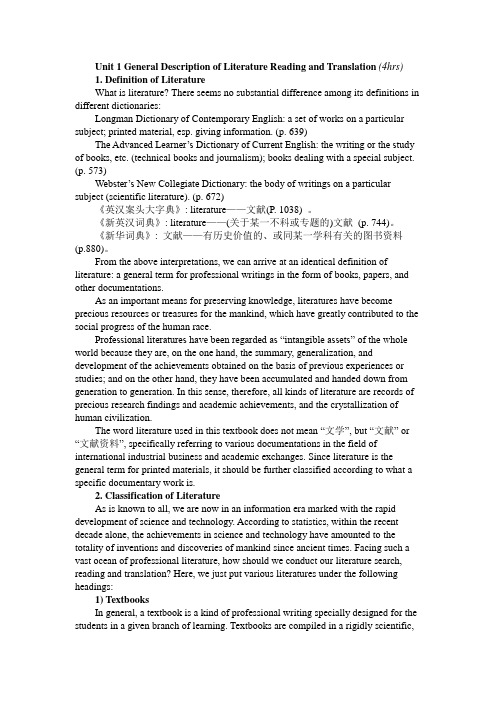
Unit 1 General Description of Literature Reading and Translation (4hrs)1. Definition of LiteratureWhat is literature? There seems no substantial difference among its definitions in different dictionaries:Longman Dictionary of Contemporary English: a set of works on a particular subject; printed material, esp. giving information. (p. 639)The Advanced Learner‟s Dictionary of Current English: the writing or the study of books, etc. (technical books and journalism); books dealing with a special subject. (p. 573)Webster‟s New Collegiate Dictionary: the body of writings on a particular subject (scientific literature). (p. 672)《英汉案头大字典》: literature——文献(P. 1038) 。
《新英汉词典》: literature——(关于某一不科或专题的)文献(p. 744)。
《新华词典》: 文献——有历史价值的、或同某一学科有关的图书资料(p.880)。
From the above interpretations, we can arrive at an identical definition of literature: a general term for professional writings in the form of books, papers, and other documentations.As an important means for preserving knowledge, literatures have become precious resources or treasures for the mankind, which have greatly contributed to the social progress of the human race.Professional literatures have been regarded as “intangible assets” of the whole world because they are, on the one hand, the summary, generalization, and development of the achievements obtained on the basis of previous experiences or studies; and on the other hand, they have been accumulated and handed down from generation to generation. In this sense, therefore, all kinds of literature are records of precious research findings and academic achievements, and the crystallization of human civilization.The word literature used in this textbook does not mean “文学”, but “文献” or “文献资料”, specifically referring to various documentations in the field of international industrial business and academic exchanges. Since literature is the general term for printed materials, it should be further classified according to what a specific documentary work is.2. Classification of LiteratureAs is known to all, we are now in an information era marked with the rapid development of science and technology. According to statistics, within the recent decade alone, the achievements in science and technology have amounted to the totality of inventions and discoveries of mankind since ancient times. Facing such a vast ocean of professional literature, how should we conduct our literature search, reading and translation? Here, we just put various literatures under the following headings:1) TextbooksIn general, a textbook is a kind of professional writing specially designed for the students in a given branch of learning. Textbooks are compiled in a rigidly scientific,systematic and logical way. Comparatively, the content of a textbook is mature and well established, because it has been compiled through the writer‟s careful selection, verification, discrimination, integration and comprehensive study of the subject. If you intend to acquire a general knowledge of a certain subject over a larger area, or if you want to have a preliminary understanding of a certain issue, you‟d better go over the relevant textbooks, which proves the best policy.2) MonographsA monograph is “an arti cle or short book on one particular subject or branch of a subject that the writer has studied deeply” (Longman Dictionary of Contemporary English, p. 704). It is also a “detailed scientific account, esp. a published report on some item of research” (The Advanced Learner‟s Dictionary of Current English, p. 632). The content of a monograph usually includes the history and present status of a particular subject, observed data, experimental methods and results, existing problems and the developing trend, various viewpoints and discussions of different schools of thought, research achievements and further exploration, and so on. A monograph usually functions as an important guide for the reader to understand the particular study comprehensively and deeply.3) PapersPapers are the most important and reliable sources for textbooks, monographs, and all the other documentary works. A complete paper is usually composed of the following elements: title, author, affiliation, abstract, keywords, introduction, theoretical analysis and/or experimental description, results and discussion or conclusion, acknowledgments, references, etc. (detailed description and exemplification of these elements in a professional paper are given in a separate textbook entitled Paper Writing and Publication, by Hu Gengshen, et al., Beijing: Higher Education Press, 2000.) A paper usually deals with a relatively specific topic, and with a comparatively narrow subject.4) EncyclopediasAn encyclopedia is “a book or set of books dealing with every branch of knowledge, or with one particular branch, in alphabetical order.” The difference between a dictionary and an encyclopedia is that “A dictionary explains words and an encyclopedia explains facts.” (Longman Dictionary of Contemporary English, p.361) As a basic reference book of generalized and summarized knowledge, an encyclopedia is usually compiled by many experts of many branches through many years. The contents of an encyclopedia, therefore, are comparatively mature and correct. It virtually serves as an important information retriever, providing comprehensive and systematic information about everything.The information retriever as such also includes yearbooks, dictionaries, guides, handbooks, and the like.5) PeriodicalsA periodical is a series of publications that appear at regular intervals. Periodicals are of various categories. From the perspective of names, for example, they are journals, acta, magazines, bulletins, rapid communications, letters, proceedings, records, abstracting services, reviews, indexes, etc., which constitute themain body of literature.Periodicals are characterized by being large in number and in variety, extensivein content and in circulation, mixed in language and in form, etc.Along with the rapid development of science and technology, periodicals have been rapidly increasing and have‟ been gradually professionalized, integrated and computerized.6) Special DocumentationThe so-called special documentation refers to all the printed materials that are non-books or non-periodicals. This special documentation mainly includes: standards, patent documents, trademarks, copyrights, contracts/agreements, reports, conference papers, dissertations (or theses), Product specifications, government publications, proposals, technical archives, electronic hypertexts, etc. Though neither books nor periodicals published regularly or publicly, the special documentation proves to be most effective resources for information retrieval. Insofar as literature search and reading are concerned, this kind of special documentation should not be overlooked. On the contrary, it calls for our special attention--that is why we have placed special emphasis on special documentation in the present textbook.Notes:1. journals, Acta, magazines, bulletins, rapid communications, letters, proceedings, records, abstracting services, reviews, indexes, etc. 会刊,学报,杂志,通报,快讯,通信稿,会议录,文献记录,世界文摘服务,评论,索引等2. hypertext 超级文本(指信息高速公路上的文件)3. Linguistic Features of Scientific LiteratureStylistically, literature is a kind of formal writing. Compared with an informal writing which usually utilizes an informal tone and colloquial language, a formal writing is a more serious approach to a subject of great importance and it avoids all colloquial expressions. Since the functions of scientific literature are to reveal creative research achievements, facilitate professional information retrieval, and help improve the development of science and technology, it deals objectively with the study of facts or problems; analyses on literature are based on relevant data, not on personal feelings, and discussions or conclusions are made on the basis of specific experiments or investigations.Syntactically, scientific literature has rigorous grammatical structures, and in most cases is rather unitary. Frequently used are indicative sentences, imperative sentences, complex sentences, and “It be + adj. (participle) + that ...” sentence patterns, etc.Morphologically, scientific literature is featured by high specialization, the use of technical terms and jargons, unambiguous implication and the fixed sense of the word. There are more compound words, Latin and Greek words, contracted words, noun clusters and so on in scientific literature than in other informational writing.Besides, non-verbal language is also very popular in various literatures such as signs, formulas, charts, tables, photos, etc. for the sake of accuracy, brevity, and clarity.Different literatures may have different linguistic features although they do havesimilar characteristics in common. The linguistic features of an individual literature will be discussed together with the specific category of documentation in the corresponding Unit of this textbook. To learn the linguistic features of various literatures will be beneficial not only to documentation reading but also to the translation and writing of such documentary works.4. Search for Relevant LiteratureThe search for relevant literature needed for professional study and research has become a practical skill for professionals. This is important because an effective way of literature search and reading will facilitate our information retrieval within a shorter period of time. In fact, everyone may have his/her own way of literature search and reading. And the following are some usual approaches:1) Global SearchBy “global search” we mean to search for materials around the subject in a larger dimension or within a wider range, i.e., conducting the extensive reading. For example:(1) Search for relevant books through the Classified and Specified Catalogues.(2) Search for periodicals through the Newspapers and Journals Indexing.(3) Search for domestic literature through the Domestic Sci-tech Data Catalogues.(4) Search for current foreign literature through the Sci-Tech Translation Bulletin.(5) Search for literature at home and abroad through INTERNET, WWW (World Wide Web), and other electronic retrieval means.2) Specific SearchBy “specific search” we mean to search for literature about a certain topic withina specific area or in a narrower scope. For example:(1) Select some most-related papers for intensive reading.(2) Expand the scope of the reading only on the basis of the references of the selected papers.(3) Try to find out relevant “reviews” on the topic so as to know the authoritative comments, the experts‟ views, the global developing trend and the general on-goings, etc.3) Processed SearchBy “processed search” we mean to accumulate and absorb essential information in the course of literature search and reading. For example:(1) Store the searched literature by careful note-taking and self-abstracting.(2) Sort out the searched documentation by timely putting them into different categories.(3) Digest/Absorb the searched information by creatively analyzing and synthesizing.It is very important to identify and then make generalization of the essential parts of the research papers, because the author of a paper should and must present his/her achievements or research findings through these parts. For this purpose, as a researcher, one has to be good at doing retrieval reading. By retrieval reading wemean retrospect reading of the manuscript in a very careful way so as to identify, register and generalize the gist or the main parts of work, or contributions we have made in a given paper. Literally, we mean reading the manuscript in a thorough manner and making notes: (1) as to the subjects dealt with, particularly subjects concerning with new information given incidentally; and (2) as to the new result and conclusive ideas reported. Material relating to each subject should then be gathered together in a logical way; and (3) all the sentences generalizing the main ideas of all the original materials should be put together so as to be well-versed, abstract-brief, condensed, complete, yet easily readable.In the final analysis, to digest and absorb useful information is the ultimate purpose of literature search and reading. This is a process of discarding the dross and selecting the essential, eliminating the false and retaining the true, proceeding from the easy to the difficult and from the outer to the inner. It is also a process of reading, selecting, sorting, synthesizing, commenting, rationalizing, systematizing, reprocessing, etc.One thing that needs to be mentioned is that an awareness of information discrimination is highly necessary, for the collection and absorption of erroneous knowledge and information is harmful. Just as a western scientist says: “The fool collects data and the wise man selects them.” This remark, th ough drastic, is indeed philosophical.Notes1. through the Classified and Specified Catalogues 通过《分类目录或专题目录》2. through the Newspapers and Journals Indexing 通过《全国报刊索引》3. through the Domestic Sci-Tech Data Catalogues 通过《国内资料科技目录》4. Sci-Tech Translation Bulletin 《科技译文通报》5. the fool collects data and the wise man selects them 愚者采集资料,智者选择资料5. Review of this chapterDefinition of Literature: a set of works on a particular subject; printed material, esp. giving information; the body of writings on a particular subject (scientific literature)Classification of Literature: textbooks, monographs, papers, encyclopedias, periodicals, special documentation, etc.Linguistic Features of Scientific Literature: stylistically, a kind of formal writing, with rigorous and unitary grammatical structure, highly specialized and unambiguous wording for semantic accuracy, etc.Search for Relevant Literature: global search, specific search, and processed search Supplementary Readings on Informational Retrieval: retrieval system, microfilm, internet. database, reformat, on, e-mail, information infrastructure, information superhighwayTranslation Skills (1): Translation in General and Translation of Special LiteratureTranslation is a rendering of ideas or concepts from one language into another,i.e., the faithful representation in the target language of what is written or said in the original language.As a means of communication, translation plays an important role in human civilization. In the West, literary translation can be traced back to 300 BC; while in China, recorded translation activities are even earlier, dating from Zhou Dynasty (1100 BC). However, not until the recent centuries, especially by the end of the 19th century did systematic study of translation get under way. The recent decades have seen rapid development in translation theories and translation activities both at home and abroad.A modern society sees an extensive use of translation on various occasions. Proper and dexterous translation helps promote mutual understanding between peoples of different cultural and social backgrounds, whereas improper rendering of words or expressions leads to confusion. Take the ordinary word “menu” for example. Its original meaning is “a list of dishes in a meal or to be ordered as separated meals, esp. in a restaurant”, and the Chinese equivalent seems to be clear: 菜单. However, when it is used in computer science, its meaning shifts to “a list shown on the display of a computer from which a user can select the operation the computer is to perform.”Evidently the Chinese counterpart should be something like “选项、项目单” It is a pity that the initial translator neglected this definition, and as a result, this very popular term of computer science fails to convey its true meaning in Chinese--the translated term”菜单” sounds incongruous with its actual content. So is the rendering of “Renaissance”--commonly known as “文艺复兴” in Chinese. Although we know today that the movement extended far beyond the literature and art circle, and the connotation of “Renaissance” is much more profound than that of the Chinese term “文艺复兴”, yet it is generally accepted through common practice. Such improper rendering is not uncommon in Chines-English translation. A sweet and melodious trademark in Chinese, by improper translation, may cause uneasiness or even create a loathsome image in the mind of people of different social and cultural backgrounds. For example, a popular Chinese lipstick with the trademark “芳芳”, when transliterated into English as “Fangfang”, assumes a hideous image--the English word “fang” happens to have two disagreeable definitions: a, a long, sharp tooth of a dog; b.a snake‟s poisonous tooth. Consequently, this awkward transliteration has resulted in a complete failure in marketing. Similar translation blunders are not unusual in social or economic activities in our country. To name a few, translating “五讲四美、三热爱”into “five stresses, four beauties and three loves”, “抓紧施肥” into “grasp manure”, “街道妇女” into “street women”, “白酒”into “white wine”, etc. Had the translators had sufficient translation knowledge, such blunders would have been avoided.1. Nature and Scope of TranslationWhat is translation? Some people believe it is a science, others take it as an art; and yet many consider it a craft, or rather, a skill.Of these varied definitions, which one holds true for our purpose? The answer depends on how w e understand or interpret the word “translation”, for the very word “translation” itself is ambiguous. And the Chinese equivalent fanyi sounds even fuzzier. Fanyi, in Chinese, may either stand for a subject in the curriculum, a jobpeople engage in, a piece of literary work, or the translating or interpreting work itself. Sometimes, fanyi may even refer to the translator or interpreter himself/herself.If the word “translation” refers to a subject, namely, the study of translation theory and skills, it is no doubt a science, just as any subject is, with its own rules, laws and principles for the translators to observe; however, if it refers to some specific pieces of translation, then it is more like an art, with each piece of them manifesting its own charms and style in the creative hands of the translator; whereas, if it refers to a process, in which something is translated, then we may regard it as a craft or skill. For unlike any branch of natural science, the process of translation has its own nature, and none of its rules and principles are universally applicable. Therefore, it entails a lot of practice, and particular craftsmanship and skills are reflected by the touches of different translators.Translation covers a very broad range. In terms of languages, it can be divided into two categories: from native languages into foreign languages and vice versa; in terms of the mode, it can be divided into oral interpretation and written translation; in terms of materials to be translated, there are translation of scientific materials, translation of literary works such as novels, stories, prose, poetry, drama, etc., translation of political essays such as treatises on social problems, repons, speeches, etc., and translation of practical writing (as official documents, contracts and agreements, notices, receipts, etc.); in terms of disposal, it can be either full-text translation, abridged translation or adapted translation.2. Principles or Criteria of TranslationThe so-called principles and criteria of translation are actually the two sides of the same coin. That is, on the part of the translator, he or she should follow them while translating; whereas on the part of the reader or critic, he or she may use the principles and criteria to evaluate translation works. Whenever principles or criteria of translation are under discussion in China, Yan Fu‟s “three-character guide”--xin, da, ya, namely, “faithfulness (信), expressiveness (达), and elegance (雅)”, which was first proposed in 1898, would evoke controversy.In the past decades, Mr. Yan‟s principle has always been regarded as aplumb-line for measuring the professional level of translation and a goal for translators to strive after. However, in the application of this principle, people come to find some unsatisfactory aspects of the three-character guide and have put foreword a variety of new standards or criteria of translation.Despite a variety of opinions, two criteria are almost unanimously accepted by all, namely, the criterion of faithfulness/accuracy (忠实/准确) and that of smoothness (流畅). We may also take these two criteria as the principles of scientific literature translation. By faithfulness/accuracy, we mean to be faithful not only to the original contents, to the original meaning and views, but also to the original form and style. By smoothness, we mean not only easy and readable rendering, but also idiomatic expression in the target language, free from stiff formula and mechanical copying from dictionaries.3. Literal Translation and Free TranslationThe process of translation consists of two phases: comprehension and expression.Generally speaking, comprehension is of foremost importance, and expression is the natural consequence of thorough comprehension. However, in the practice we may find that now and then some words or phrases in their usual senses are very difficultto deal with because of the disparity between English and Chinese. In this case, we have to resort to some special means of translation. Literal translation (直译) and free translation (意译) are two dynamic approaches in dealing with such awkward situations.The so-called literal translation, superficially speaking, means “not to alter the original words and sentences”; strictly speaking, it strives “to keep the s entiments and style of the original.” It takes sentences as its basic units and takes the whole text (discourse) into consideration at the same time in the course of translation. Furthermore, it strives to reproduce both the ideological content and the style of the original works and retains as much as possible the figures of speech. There are quite a lot of examples of successful literal translation that have been adopted as idiomatic Chinese expressions. For example, crocodile‟s tears (鳄鱼的眼泪), armed to the teeth (武装到牙齿), chain reaction (连锁反应), gentlemen‟s agreement (君子协定), and so on. Similarly, some Chinese idioms also find their English counterparts through literal translation. For example, 纸老虎(paper tiger),一国两制(one country, two systems ), and so on.Free translation is an alternative approach which is used mainly to convey the meaning and spirit of the original without trying to reproduce its sentence patterns or figures of speech. This approach is most frequently adopted when it is really impossible for the translator to do literal translation. For example:Adam‟s Apple 喉结at sixes and sevens 乱七八槽It rains cats and dogs. 大雨滂沱Don‟t cross the bridge till you get to it. 不必担心过早。
英文文献翻译1-6
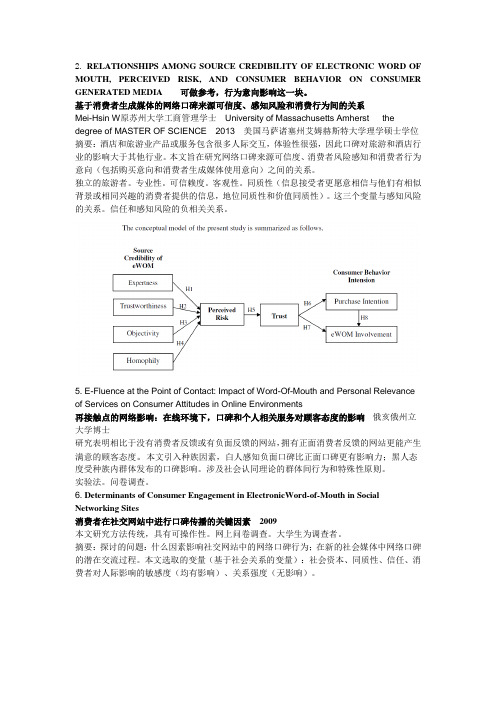
2. RELATIONSHIPS AMONG SOURCE CREDIBILITY OF ELECTRONIC WORD OF MOUTH, PERCEIVED RISK, AND CONSUMER BEHAVIOR ON CONSUMER GENERATED MEDIA 可做参考,行为意向影响这一块。
基于消费者生成媒体的网络口碑来源可信度、感知风险和消费行为间的关系Mei-Hsin W原苏州大学工商管理学士University of Massachusetts Amherst the degree of MASTER OF SCIENCE 2013 美国马萨诸塞州艾姆赫斯特大学理学硕士学位摘要:酒店和旅游业产品或服务包含很多人际交互,体验性很强,因此口碑对旅游和酒店行业的影响大于其他行业。
本文旨在研究网络口碑来源可信度、消费者风险感知和消费者行为意向(包括购买意向和消费者生成媒体使用意向)之间的关系。
独立的旅游者。
专业性。
可信赖度。
客观性。
同质性(信息接受者更愿意相信与他们有相似背景或相同兴趣的消费者提供的信息,地位同质性和价值同质性)。
这三个变量与感知风险的关系。
信任和感知风险的负相关关系。
5. E-Fluence at the Point of Contact: Impact of Word-Of-Mouth and Personal Relevance of Services on Consumer Attitudes in Online Environments再接触点的网络影响:在线环境下,口碑和个人相关服务对顾客态度的影响俄亥俄州立大学博士研究表明相比于没有消费者反馈或有负面反馈的网站,拥有正面消费者反馈的网站更能产生满意的顾客态度。
本文引入种族因素,白人感知负面口碑比正面口碑更有影响力;黑人态度受种族内群体发布的口碑影响。
涉及社会认同理论的群体间行为和特殊性原则。
实验法。
问卷调查。
文献阅读翻译
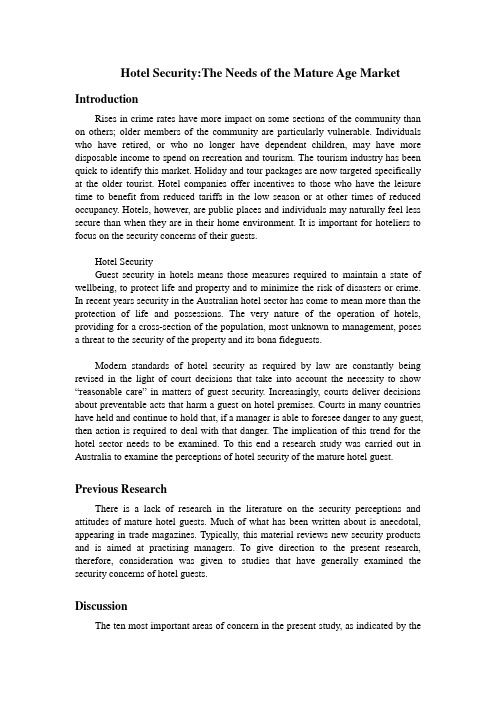
Hotel Security:The Needs of the Mature Age Market IntroductionRises in crime rates have more impact on some sections of the community than on others; older members of the community are particularly vulnerable. Individuals who have retired, or who no longer have dependent children, may have more disposable income to spend on recreation and tourism. The tourism industry has been quick to identify this market. Holiday and tour packages are now targeted specifically at the older tourist. Hotel companies offer incentives to those who have the leisure time to benefit from reduced tariffs in the low season or at other times of reduced occupancy. Hotels, however, are public places and individuals may naturally feel less secure than when they are in their home environment. It is important for hoteliers to focus on the security concerns of their guests.Hotel SecurityGuest security in hotels means those measures required to maintain a state of wellbeing, to protect life and property and to minimize the risk of disasters or crime. In recent years security in the Australian hotel sector has come to mean more than the protection of life and possessions. The very nature of the operation of hotels, providing for a cross-section of the population, most unknown to management, poses a threat to the security of the property and its bona fideguests.Modern standards of hotel security as required by law are constantly being revised in the light of court decisions that take into account the necessity to show “reasonable care” i n matters of guest security. Increasingly, courts deliver decisions about preventable acts that harm a guest on hotel premises. Courts in many countries have held and continue to hold that, if a manager is able to foresee danger to any guest, then action is required to deal with that danger. The implication of this trend for the hotel sector needs to be examined. To this end a research study was carried out in Australia to examine the perceptions of hotel security of the mature hotel guest. Previous ResearchThere is a lack of research in the literature on the security perceptions and attitudes of mature hotel guests. Much of what has been written about is anecdotal, appearing in trade magazines. Typically, this material reviews new security products and is aimed at practising managers. To give direction to the present research, therefore, consideration was given to studies that have generally examined the security concerns of hotel guests.DiscussionThe ten most important areas of concern in the present study, as indicated by themean for each question and ranging from most to least important, were: emergency telephone number by bed; well-lit hotel corridors; door security chains; security liability insurance; bomb threat procedures; security personnel trained in unarmed defence; security officers having knowledge of civil and criminal law; closed circuit TV in hotel car parks; advising guests of criminal activity near hotel; and, control of access to guest areas. Ten least important areas were (from least important): plain clothes security officers carrying firearms; uniformed officers carrying firearms; the searching of guest’s luggage; carrying of handcuffs by security personnel; number of arrests and convictions by hotel security being an important indicator of effectiveness; electronic “sweeping”; guards controlling hotel entrances; security patrols by plain clothes security personnel; security patrols by uniformed security personnel; and, the need for female security officers. This later ranking is an interpretation placed on the data by the researchers, as respondents were merely asked to strongly agree, or otherwise, with statements about security.When the results of both studies are compared in Table V, agreement on the non deployment of armed hotel security personnel is clear. There was no support for this concept, as it received the lowest overall rating. Other responses are less easy to classify. The statement “When it comes to hotel security, prevention is better than cure”, which was included a s a check for consistency, received a mean score of 4.698 and rated a tied second place. This contrasts with the respondents’ perceptions on preventative security measures, for example uniformed security patrols. Only ten respondents agreed and twostrongly agreed with the need for security patrols.There is considerable clustering of the data that correspond to items 5, 10, 13, 17 and 22. These relate to security patrols by uniformed personnel, security departments that have a high level of detection are effective departments; carrying of handcuffs by security personnel; electronic sweeping to prevent eavesdropping; and a statement that says “the standard of security in hotels is adequate”. This would appear to indicate that a majority of the respondents were indifferent about these aspects of security. An inspection of the means and standard deviations of these items supports this contention.ConclusionThis research has indicated some areas that the industry may wish to consider for the development and adoption of standards of security. The provision of door security chains, ranked number 3 in Rutherford and McConnell’s research and number 4 in the present study illustrates this, and relates to the provision of reasonable care by the management of the hotel.It has been suggested that the concept of “reasonable care” should be the basis of all security policies[13]. This requirement is derived from common law, under whicha citizen may sue another individual or corporation. For a plaintiff to win a negligence case, four elements must be present. The first is duty; there is a duty on persons to exercise reasonable care in their dealings with other people. Second is a breach of that duty. The third is proximate cause; lack of reasonable care should be the primary reason for the plaintiff to bring a complaint. Finally, there is the matter of damages. The plaintiff should have incurred damages for which he or she is seeking recompense. It might be inferred from this that there is a duty on the hotel management, for example, to equip doors with security chains. It is the duty of the guest to use them to prevent intruders from entering the room.If the hotel does not equip guest rooms with this relatively inexpensive security precaution and the guest is subsequently robbed or harmed by an intruder, then it can be strongly argued that the hotel management did not exercise reasonable care by not providing a door chain. More importantly, was the fact that a chain was not provided the proximate cause of the guest being robbed? If this is the case then the hotel is liable. If courts subsequently find in favour of the guest then it may be argued that door security chains have become a de facto security requirement.A lack of agreed industry standards for security may lead to hotels having court mandated standards imposed upon them. These de facto standards may be at odds withthe level and types of security that this study appears to suggest is acceptable for an important part of the Australian hotel market. With the rising crime statistics management need to be aware of the possibility of unacceptable security requirements being imposed.These results have obvious implications for the management of security in hotels. There is a need for industry wide standards of security. Development of such standards is a significant feature of risk management and should be a high priority for the industry.酒店安全:成熟年龄市场的需求一、摘要犯罪率的上升更多地影响了社会上的部分人;旧社会的成员,特别容易受影响。
文献阅读课翻译
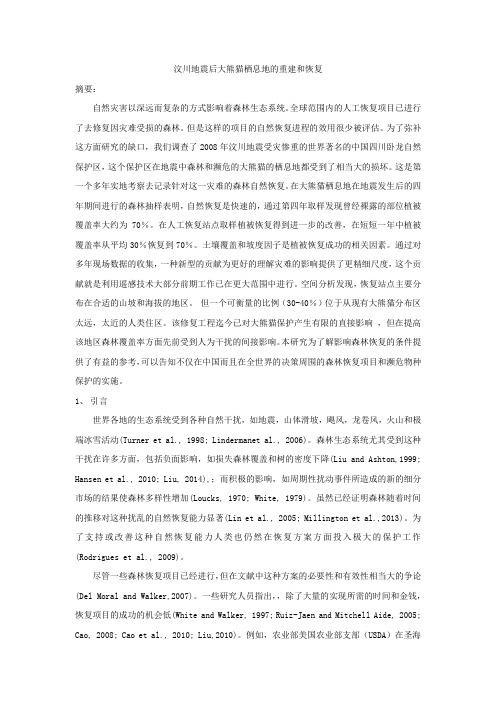
汶川地震后大熊猫栖息地的重建和恢复摘要:自然灾害以深远而复杂的方式影响着森林生态系统。
全球范围内的人工恢复项目已进行了去修复因灾难受损的森林。
但是这样的项目的自然恢复进程的效用很少被评估。
为了弥补这方面研究的缺口,我们调查了2008年汶川地震受灾惨重的世界著名的中国四川卧龙自然保护区,这个保护区在地震中森林和濒危的大熊猫的栖息地都受到了相当大的损坏。
这是第一个多年实地考察去记录针对这一灾难的森林自然恢复。
在大熊猫栖息地在地震发生后的四年期间进行的森林抽样表明,自然恢复是快速的,通过第四年取样发现曾经裸露的部位植被覆盖率大约为70%。
在人工恢复站点取样植被恢复得到进一步的改善,在短短一年中植被覆盖率从平均30%恢复到70%。
土壤覆盖和坡度因子是植被恢复成功的相关因素。
通过对多年现场数据的收集,一种新型的贡献为更好的理解灾难的影响提供了更精细尺度,这个贡献就是利用遥感技术大部分前期工作已在更大范围中进行。
空间分析发现,恢复站点主要分布在合适的山坡和海拔的地区。
但一个可衡量的比例(30-40%)位于从现有大熊猫分布区太远,太近的人类住区。
该修复工程迄今已对大熊猫保护产生有限的直接影响,但在提高该地区森林覆盖率方面先前受到人为干扰的间接影响。
本研究为了解影响森林恢复的条件提供了有益的参考,可以告知不仅在中国而且在全世界的决策周围的森林恢复项目和濒危物种保护的实施。
1、引言世界各地的生态系统受到各种自然干扰,如地震,山体滑坡,飓风,龙卷风,火山和极端冰雪活动(Turner et al., 1998; Lindermanet al., 2006)。
森林生态系统尤其受到这种干扰在许多方面,包括负面影响,如损失森林覆盖和树的密度下降(Liu and Ashton,1999; Hansen et al., 2010; Liu, 2014),;而积极的影响,如周期性扰动事件所造成的新的细分市场的结果使森林多样性增加(Loucks, 1970; White, 1979)。
文献阅读与翻译
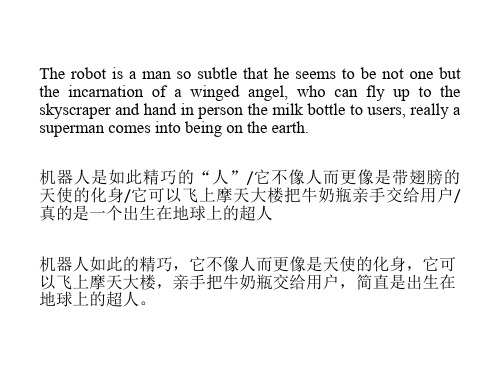
机器人是如此精巧的“人” / 它不像人而更像是带翅膀的 天使的化身/它可以飞上摩天大楼把牛奶瓶亲手交给用户/ 真的是一个出生在地球上的超人
机器人如此的精巧,它不像人而更像是天使的化身,它可 以飞上摩天大楼,亲手把牛奶瓶交给用户,简直是出生在 地球上的超人。
The theory that bacteria are serviceable in devouring contaminants, that repeated experiments have proved it true and that air may be artificially purified through dissociation, that it has so far been in embryo, an advanced one, prevails widely in the domain of environmental science. 细菌可以吞噬污染物/反复的实验证实了这一结论/空气可 以通过离解进行人工净化/这种说法还在萌芽中/超前的理 论/这个理论……在环境科学界很流行 细菌可以吞噬污染物,这一点经过反复实验的证实,空气 可以通过离解进行人工净化,这种说法还处在萌芽中,上 述这些超前的理论在环境科学界很流行。
The robot is a man so subtle that he seems to be not one but the incarnation of a winged angel, who can fly up to the skyscraper and hand in person the milk bottle to users, really a superman comes into being on the earth.
文献查阅及翻译示例
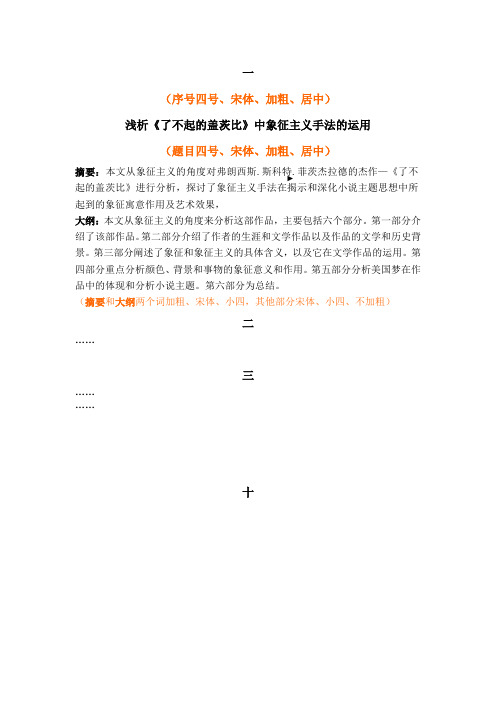
一(序号四号、宋体、加粗、居中)浅析《了不起的盖茨比》中象征主义手法的运用(题目四号、宋体、加粗、居中)摘要:本文从象征主义的角度对弗朗西斯.斯科特.菲茨杰拉德的杰作—《了不起的盖茨比》进行分析,探讨了象征主义手法在揭示和深化小说主题思想中所起到的象征寓意作用及艺术效果,大纲:本文从象征主义的角度来分析这部作品,主要包括六个部分。
第一部分介绍了该部作品。
第二部分介绍了作者的生涯和文学作品以及作品的文学和历史背景。
第三部分阐述了象征和象征主义的具体含义,以及它在文学作品的运用。
第四部分重点分析颜色、背景和事物的象征意义和作用。
第五部分分析美国梦在作品中的体现和分析小说主题。
第六部分为总结。
(摘要和大纲两个词加粗、宋体、小四,其他部分宋体、小四、不加粗)二……三…………十An Analysis of Symbolism in The Great Gatsby(Times New Roman,四号,加粗,居中)Abstract:This thesis is aimed at analyzing symbolism in The Great Gatsby and discusses how the disillusionment of American Dream is revealed by means of symbolism.Outline:1.Introduction2.Fitzgerald and The Great Gatsby3. Symbolism in Literature4. Symbolism in The Great Gatsby4.1 The Symbolic Meaning of Objects4.1.1 East Egg and West Egg4.1.2 The Green Light4.1.3 The Valley of Ashes4.1.4 The Gigantic Eyes of Doctor T. J. Eckleburg4.1.5 Automobiles4.1.6 Clocks and Time4.2 The Symbolic Meaning of Colors4.2.1 Green4.2.2 White4.2.3 Gold and Yellow4.3 The Symbolic Meaning in the American Dream4.3.1 The Great Gatsby and the American Dream4.3.2 Francis Scott Fitzgerald and the American Dream5. Conclusion(Abstract和outline两个词加粗、Times New Roman、小四,其他部分Times New Roman、小四、不加粗)查阅的文献要打印出来。
研究生科技英语阅读课文翻译(1-10).
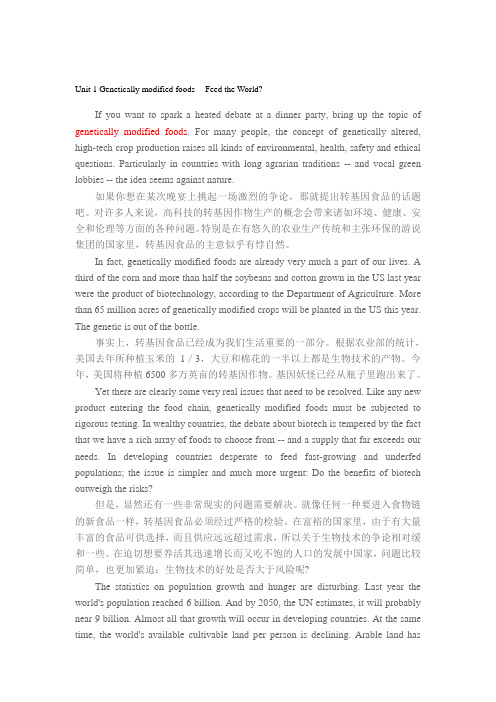
Unit 1 Genetically modified foods -- Feed the World?If you want to spark a heated debate at a dinner party, bring up the topic of genetically modified foods. For many people, the concept of genetically altered, high-tech crop production raises all kinds of environmental, health, safety and ethical questions. Particularly in countries with long agrarian traditions -- and vocal green lobbies -- the idea seems against nature.如果你想在某次晚宴上挑起一场激烈的争论,那就提出转基因食品的话题吧。
对许多人来说,高科技的转基因作物生产的概念会带来诸如环境、健康、安全和伦理等方面的各种问题。
特别是在有悠久的农业生产传统和主张环保的游说集团的国家里,转基因食品的主意似乎有悖自然。
In fact, genetically modified foods are already very much a part of our lives. A third of the corn and more than half the soybeans and cotton grown in the US last year were the product of biotechnology, according to the Department of Agriculture. More than 65 million acres of genetically modified crops will be planted in the US this year. The genetic is out of the bottle.事实上,转基因食品已经成为我们生活重要的一部分。
研究生英语阅读教程课文全文参考译文
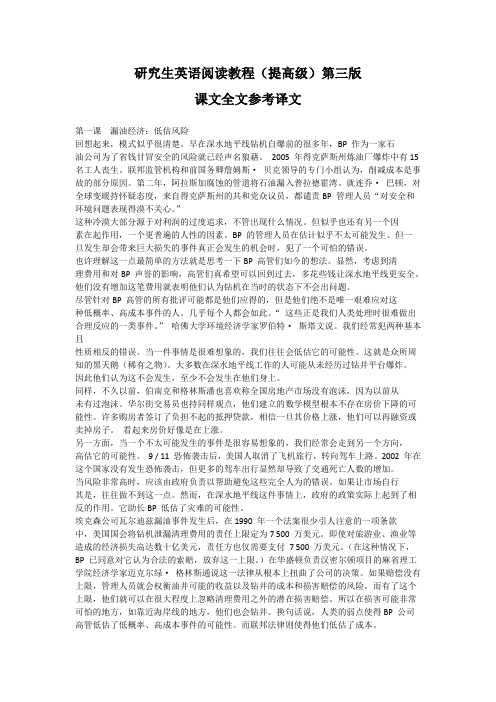
研究生英语阅读教程(提高级)第三版课文全文参考译文第一课漏油经济:低估风险回想起来,模式似乎很清楚。
早在深水地平线钻机自爆前的很多年,BP 作为一家石油公司为了省钱甘冒安全的风险就已经声名狼藉。
2005 年得克萨斯州炼油厂爆炸中有15 名工人丧生。
联邦监管机构和前国务卿詹姆斯·贝克领导的专门小组认为,削减成本是事故的部分原因。
第二年,阿拉斯加腐蚀的管道将石油漏入普拉德霍湾。
就连乔·巴顿,对全球变暖持怀疑态度,来自得克萨斯州的共和党众议员,都谴责BP 管理人员“对安全和环境问题表现得漠不关心。
”这种冷漠大部分源于对利润的过度追求,不管出现什么情况。
但似乎也还有另一个因素在起作用,一个更普遍的人性的因素。
BP 的管理人员在估计似乎不太可能发生、但一旦发生却会带来巨大损失的事件真正会发生的机会时,犯了一个可怕的错误。
也许理解这一点最简单的方法就是思考一下BP 高管们如今的想法。
显然,考虑到清理费用和对BP 声誉的影响,高管们真希望可以回到过去,多花些钱让深水地平线更安全。
他们没有增加这笔费用就表明他们认为钻机在当时的状态下不会出问题。
尽管针对BP 高管的所有批评可能都是他们应得的,但是他们绝不是唯一艰难应对这种低概率、高成本事件的人。
几乎每个人都会如此。
“这些正是我们人类处理时很难做出合理反应的一类事件。
”哈佛大学环境经济学家罗伯特·斯塔文说。
我们经常犯两种基本且性质相反的错误。
当一件事情是很难想象的,我们往往会低估它的可能性。
这就是众所周知的黑天鹅(稀有之物)。
大多数在深水地平线工作的人可能从未经历过钻井平台爆炸。
因此他们认为这不会发生,至少不会发生在他们身上。
同样,不久以前,伯南克和格林斯潘也喜欢称全国房地产市场没有泡沫,因为以前从未有过泡沫。
华尔街交易员也持同样观点,他们建立的数学模型根本不存在房价下降的可能性。
许多购房者签订了负担不起的抵押贷款,相信一旦其价格上涨,他们可以再融资或卖掉房子。
- 1、下载文档前请自行甄别文档内容的完整性,平台不提供额外的编辑、内容补充、找答案等附加服务。
- 2、"仅部分预览"的文档,不可在线预览部分如存在完整性等问题,可反馈申请退款(可完整预览的文档不适用该条件!)。
- 3、如文档侵犯您的权益,请联系客服反馈,我们会尽快为您处理(人工客服工作时间:9:00-18:30)。
U1 General Description
II. Translation
1. Put the following sentences into Chinese, using either literal or free translation. 1) It was the best of times, it was the worst of times; it was the age of wisdom, it was the age of foolishness; it was the epoch of belief, it was the epoch of incredulity; it
was the season of the Light, it was the season of Darkness; it was the spring of Hope,
it was the winter of Despair; we had everything before us, we had nothing before us; we were all going to Heaven, we were all going direct the other way.
这是最美好的时期,这是最坏的时期,这是智慧的年代,这是愚蠢的年代,这
是从满信仰的时代,这是顾虑重重的时代,这是光明的季节,这是黑暗的季节,这是富有希望的春天,这是充满绝望的寒冬;我们拥有一切,我们一无所有;
我们正笔直走向天堂,我们正笔直走向地狱。
2) A greeting card can warm a heart, hold a hand, lend an ear, pat a back, light up a face, tickle a funny bone, dry an eye, surprise a child, woo a sweetheart, toast a bride, welcome a stranger, wave a good-bye, shout a bravo, blow a kiss, mend a quarrel, ease a pain, boost a morale, stop a worry and start a tradition.
一张小小贺卡可以温暖一颗心,握紧一双手,倾听肺腑言,轻拍友人背;它另
人喜洋洋,撩得心痒痒,抹去泪汪汪;它给孩子以惊喜,给恋人以温纯,给新
娘以祝福,给路人以欢迎;它可用以挥手道别,高声喝彩,遥寄飞吻,也可用
以弥补嫌隙,减轻痛苦,提高士气,解除忧虑,开创一种新风尚。
2. Put the following passage into Chinese.
As an important means for preserving knowledge, various literatures have become precious resources or treasures for the mankind, which have greatly contributed to the social progress of the human race.
Professional literatures have been regarded as “intangible assets” of the whole world because they are, on the one hand, the summary, generalization, and development of the achievements obtained on the basis of previous experiences or studies; and on the other hand, they have been accumulated and handed down from generation to generation. In this sense, therefore, all kinds of literature are records of precious research findings and academic achievements, and the crystallization of human civilization.
作为一种重要的知识储备手段,各类文献已成为宝贵的资源宝藏,大大促进了
人类社会的进步。
专业文献一向被认为是全世界的“无形财产”。
因为一方面它们是对前人的经验
或研究成果的总结,概括和发现;另一方面,又是人类长期积累、世代相传的
遗产。
因此,从这种意义上讲,一切文献都是前人的研究发现和学术成就的宝
贵记载,是人类文化的结晶。
3. Put the following passage into English.
翻泽的意义是将词句从一种语言转换成另一种语言。
简单地讲,它是用与原作
不同的语言将作者的真正意思准确地复述出来的一种艺术。
从以上翻译的定义
来看,我们知道词句的原意必须尽可能保持准确,不可有所增删。
翻译者的任
务只是变换词汇而不是改变其意思。
因此,翻译有两种要素:准确性与表达性。
准确性是翻译的首要条件。
译者必须谨慎地遵循原作者的意思。
字词的选择与
句式结构必须如实传达原作的思想。
表达性是使译文易于理解。
换言之,译者
必须用自己的文字尽可能将原作思想清楚而有力地表达出来。
准确性是使译文
的意义确切无误,而表达性则是使译文生动,引人入胜。
Translation means the conversion of an expression into another language. To say plainly it is an art to reproduce the exact idea of the author by means of a language different from the original. From the above definition of translation we know that the original thought of the expression must be kept as exactly as possible. Nothing should be added to or taken away from the original work. The duty of the translator is simply to change the vocabulary not the thought. In translation therefore, there are two essential elements: accuracy and expressiveness.
Accuracy is the first requisite of translation. The translator must stick to the a uthor’s idea. Words selected and sentences constructed must be of such nature as will convey the exact original thought. Expressiveness is to make the translation readily understood. In other words, the translator must express his author’s idea as clearly and as forcibly as he can by the medium he employs. Accuracy is to make the thought definite and exact; while expressiveness is to make the translation vivid and attractive.。
